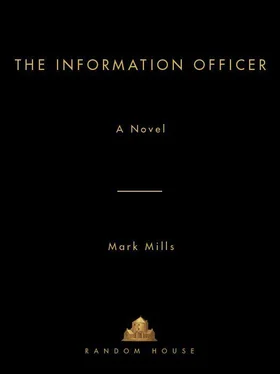Mark Mills - The Information Officer
Здесь есть возможность читать онлайн «Mark Mills - The Information Officer» — ознакомительный отрывок электронной книги совершенно бесплатно, а после прочтения отрывка купить полную версию. В некоторых случаях можно слушать аудио, скачать через торрент в формате fb2 и присутствует краткое содержание. Жанр: Старинная литература, на русском языке. Описание произведения, (предисловие) а так же отзывы посетителей доступны на портале библиотеки ЛибКат.
- Название:The Information Officer
- Автор:
- Жанр:
- Год:неизвестен
- ISBN:нет данных
- Рейтинг книги:5 / 5. Голосов: 1
-
Избранное:Добавить в избранное
- Отзывы:
-
Ваша оценка:
- 100
- 1
- 2
- 3
- 4
- 5
The Information Officer: краткое содержание, описание и аннотация
Предлагаем к чтению аннотацию, описание, краткое содержание или предисловие (зависит от того, что написал сам автор книги «The Information Officer»). Если вы не нашли необходимую информацию о книге — напишите в комментариях, мы постараемся отыскать её.
The Information Officer — читать онлайн ознакомительный отрывок
Ниже представлен текст книги, разбитый по страницам. Система сохранения места последней прочитанной страницы, позволяет с удобством читать онлайн бесплатно книгу «The Information Officer», без необходимости каждый раз заново искать на чём Вы остановились. Поставьте закладку, и сможете в любой момент перейти на страницу, на которой закончили чтение.
Интервал:
Закладка:
His eyes strayed to the top of the list, the first entry: Do nothing. Vanish away .
It was too easy. And too hard. How could he not go and stand at Carmela Cassar’s grave? She was freshly buried and waiting for his visit. It would be wrong to break the tradition. It might even bring bad luck. He sat and saw all the things that wouldn’t come to pass, and he wrote them down. As ever, on the page, things became clearer. The words bristled with undeniable truths.
He didn’t put a line through the first entry on the list; he didn’t believe in crossing things out. Everything served a purpose, momentary doubts included. Even now, he could feel a new idea taking shape, triggered by a phrase he’d just written: The next girl?
There were three he had in mind. Two were bar tarts. The third was a slim wand of a girl who worked in the garrison library. Her name was Rosaria Galdes, and she planned to become a schoolteacher when the war was over. She had a small gap between her front teeth that lent her an air of sensuality, although nothing in her bearing suggested the same. In movement and speech she was brisk to the point of awkwardness.
He had always been intrigued by this apparent contradiction in her, and was tempted to put it to the test. Maybe that time had finally come. She was the obvious candidate, and yet something was holding him back. But what?
He laid the pencil aside and lit a cigarette. He closed his eyes and emptied his mind, waiting for the answer to present itself to him. It was there, lurking at the periphery of his vision, like some wild animal patrolling the circle of light thrown by a campfire—a palpable presence, yet indistinct. He didn’t encourage it forward for fear of startling it, and when it finally stepped from the shadows, he smiled, more than satisfied with what he saw, amazed that the idea hadn’t occurred to him before.
It was perfect. She was perfect.
He spared a thought for gap-toothed Rosaria Galdes and her dream of becoming a teacher, an ambition she would now live to fulfill. He wasn’t going to stand in her way, not anymore. A new and far more satisfactory candidate had just presented herself for the post of last victim.
Taking up the pencil, he began to write, drawing up a balance sheet, weighing the beauty of the idea against the inevitable risks.
DAY SIX

IT WAS PAST MIDNIGHT BY THE TIME MAX REACHED THE Porte des Bombes on the outskirts of Floriana. The journey seemed to have passed in a flash, eaten up by memories of his conversation with Elliott.
The fellow was unfathomable, impossible to gauge. For a master of irritating circumlocutions, the revelations had come surprisingly thick and fast: the Germans’ aborted invasion plans, the governor’s imminent departure, Field Marshal Kesselring’s standing with Hitler, Rommel’s gifts and failings as a general. Was there nothing Elliott wasn’t privy to? And as for the intimation that the killings were the work of an enemy agent intent on sowing seeds of discord, what was to be made of that? Admittedly, the relationship between the British garrison and the Maltese was more strained than it had ever been, but would the enemy really have hatched such a heinous plan in order to destabilize it further? Rumors abounded of atrocities committed in the name of Hitler’s Reich—and no doubt the British had a few skeletons of their own tucked away in the same closet—but would they really go that far in the name of victory?
Quite possibly. War did that to men. Whether it forced such behavior on them or whether it offered a convenient release for some dark impulse deep within them was a debate he’d shared with Freddie on more than one occasion. Freddie subscribed to the dualist school of thought, that men were essentially good and evil at the same time. It was a view rooted in his experiences as a medical officer. He claimed to have observed it at work in the wards.
It was known that a number of Allied pilots had plummeted to their deaths after baling out, thanks to an enemy fighter making a low pass over their parachutes, collapsing the canopies with the down-draft. By the same token, it was known (though rarely spoken of) that enemy seaplanes clearly marked with red crosses had been shot to pieces while going about their business of recovering downed colleagues from the sea off Malta.
And yet, despite these aberrations, an almost innocent camaraderie prevailed in the hospitals. Injured enemy pilots and crew occupied beds in the same wards as their Allied counterparts. Not only that, they were liable to receive a string of visitors intent on plying them with cigarettes and other creature comforts.
It was true that not all the pilots condoned this practice. To Ralph’s mind, the enemy was the enemy and not to be fraternized with, although he bore the Italians slightly less rancor than he did the Germans. As a keen fan of motor racing, he felt that any nation that had produced Enzo Ferrari and Tazio Nuvolari couldn’t be all bad. He ascribed both the wariness of their bombers and the flamboyant aerobatics of their fighter pilots to the inferior nature of their aircraft. They were simply reacting to circumstances, making the best of a bad thing, as anyone in their right mind would.
He was far more wary of the Germans. This prejudice had first lodged itself in him just before the war, when he’d visited the country as part of a rowing eight cobbled together from a number of Cambridge college crews. He had found their German co-competitors at the regatta cold and high-handed and—sin of sins—obsessed with calisthenics. To cap it all, when the British eight’s engagingly amateurish approach to competition rowing had brought them victory, the home crews had proved remarkably ungracious in defeat. This unfortunate experience had flicked a switch in Ralph’s head. He now saw evidence of the German master plan wherever he looked.
Wagner’s belief in the Gesamtkunstwerk , the total work of art, and Hegel’s concept of the “Absolute Idea,” which amounted to a total philosophy of human culture, were two examples of a Teutonic propensity to extremism. A more plausible prop to Ralph’s theory, maybe, was General Erich Ludendorff’s book, published a few years before the outbreak of hostilities, entitled Total War .
Max had always found Ralph’s ideas as dangerously extreme as those he purported to despise. But maybe Ralph’s instincts were sound. In the grand scheme of things, what did the lives of a few innocent Maltese girls matter to the enemy if they served a greater purpose? The indiscriminate targeting of the islanders had seen a surge in civilian casualties over the past month, but it had also succeeded in stiffening the resolve of the people. So much better for the Germans to be selective about who they killed, and actually achieve something in the process.
Max could see the logic in the thinking. It made sense. But it also raised as many questions as it answered, not least of all: Why had Elliott chosen to share the theory with him when there had been no call to do so? It just wasn’t in Elliott’s nature to let slip something like that.
Max was no closer to determining some invisible agenda by the time he reached the Porte des Bombes, at which point questions of a more immediate kind began jostling for his attention. Would Mitzi still be expecting him to show up, even at this late hour? What if Lionel’s plans had changed and he was now happily tucked up in bed with his wife? It had happened once before, and on that occasion Mitzi had been unable to get word to Max of Lionel’s unexpected return from patrol. Letting himself into the building with the key, Max had crept silently up the staircase to the third floor only to find the door to the flat firmly locked. Thank God he’d conquered the temptation to knock. No excuse, however inspired, could have convincingly explained just what he was doing there in the dead of night.
Читать дальшеИнтервал:
Закладка:
Похожие книги на «The Information Officer»
Представляем Вашему вниманию похожие книги на «The Information Officer» списком для выбора. Мы отобрали схожую по названию и смыслу литературу в надежде предоставить читателям больше вариантов отыскать новые, интересные, ещё непрочитанные произведения.
Обсуждение, отзывы о книге «The Information Officer» и просто собственные мнения читателей. Оставьте ваши комментарии, напишите, что Вы думаете о произведении, его смысле или главных героях. Укажите что конкретно понравилось, а что нет, и почему Вы так считаете.










